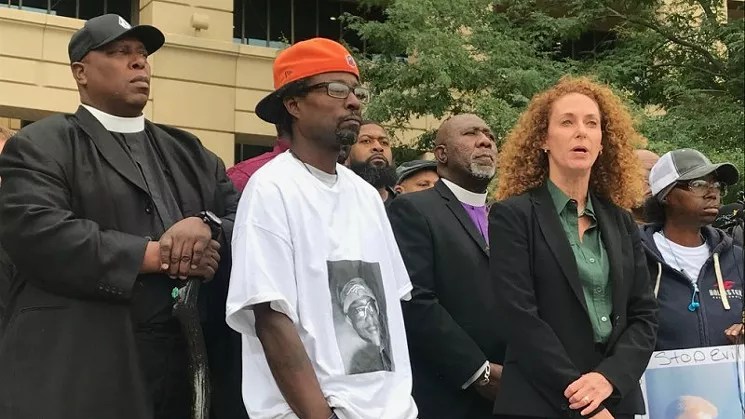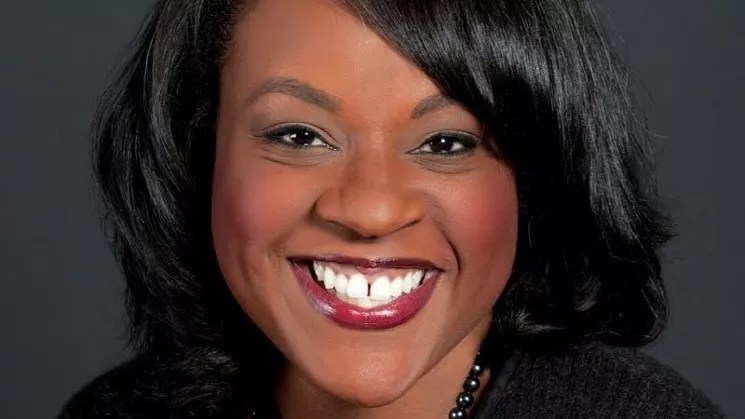
Michael Roberts

Audio By Carbonatix
Why are no officers being prosecuted in the high-profile death of De’Von Bailey, who was shot in the back by Colorado Springs police while running away, or the passing of Elijah McClain after being pummeled by Aurora cops despite having done nothing illegal?
Police-reform advocates argue that investigations of such incidents are typically conducted by agencies that have close connections to the departments in the spotlight, making outcomes friendly to law enforcement not only predictable, but inevitable. And in Bailey’s case, attorney Darold Killmer cites language in the Colorado law known as the “fleeing felon” statute that he considers to be blatantly unconstitutional.
Both of these issues are likely to be addressed in the 2020 Colorado legislative session, confirms Representative Leslie Herod.
“What a bill will look like is yet to be determined,” Herod notes. “But we are looking at addressing the fleeing felon statute, an independent office for investigative situations and the standard for when it is appropriate for officers to use force.”
Killmer’s Denver-based law firm, Killmer, Lane & Newman LLP, represents the families of Bailey and McClain, and his colleagues, David Lane and Mari Newman, have called for changes in the way police-related deaths in Colorado are handled.
In discussing the fatal shooting of Rifle’s Alan George, who, like Bailey, was trying to get away when he took bullets to the back, Lane opined, “When the police investigate the police, it usually works out pretty well for the police. This is a corrupt system that allows this to occur.” In his view, “There needs to be a statewide, independent investigator who deals with police misconduct that rises to a criminal level. It needs to be taken out of the hands of these corrupt local politicians with law degrees.”

Representative Leslie Herod is looking for a solution.
Courtesy of Leslie Herod
When asked about this idea in the context of the McClain case, Newman endorsed the idea. In her words, “Not only do I agree, but I’ve spoken with Governor [Jared] Polis about it, and I’ve also been working with members of our state legislature to move forward with something like that.”
Herod confirms that she’s been coordinating with Newman on the subject, as well as plenty of others. “We’re gathering input from stakeholders about what a process would look like,” she says. “We need to look at the process law enforcement uses in lethal force cases and whether that’s transparent for the community, family members and all of those who are impacted. We need to ensure that there’s trust in the process, and that the process is fair – that there is accountability.”
In her view, the issue “goes beyond the specific cases that have happened in Colorado recently. I believe law enforcement should be held to a higher standard in our community, and I also want to ensure that our community is kept safe, and that law enforcement is kept safe. We need to strike a balance between their safety and the safety of those they’re protecting. But these suspects need to have fair trials, and they can’t plead their case if they’re not alive.”
As for McClain, he wasn’t suspected of committing a crime; police were alerted merely because he was wearing a ski mask over his face and dancing to music in a manner a 911 caller found odd. To Herod, what happened to him underscores the fact that “black and brown men, in particular are often seen as threats even if nothing has been proven. But if they’re at a higher threat level just by walking across the street, should an officer be justified in shooting them? No. Law enforcement has to make snap decisions all the time, and the majority of the time, they make the right decision. But when they don’t – when they don’t have the ability to use their discretion in appropriate ways – they shouldn’t be doing this work.”
At the same time, Herod stops short of saying exactly what her legislation will contain. “I believe this will take a lot of conversation,” she maintains, “and I want to make sure we have those conversations in a robust way. We definitely need to meet with all of those who are directly impacted: families, attorneys, law enforcement officers, district attorneys, the Colorado Attorney General’s Office. All of these players need to be a part of the conversation, and having media attention on this bill will bring more folks to the table who are not always included in the process. I think that’s really imperative. My door’s open.”